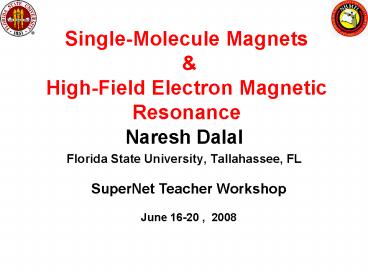SingleMolecule Magnets
1 / 26
Title:
SingleMolecule Magnets
Description:
Large molecular clusters containing paramagnetic transition metals ... Quantum-mechanical behavior at the macroscopic level (steps in magnetic hysteresis loops) ... –
Number of Views:60
Avg rating:3.0/5.0
Title: SingleMolecule Magnets
1
Single-Molecule Magnets High-Field Electron
Magnetic Resonance
- Naresh Dalal
- Florida State University, Tallahassee, FL
SuperNet Teacher Workshop June 16-20 , 2008
2
Outline
- What are Single-Molecule Magnets (SMM)?
- Advantages of High Field EMR
- Recent Chemical Applications
- Conclusions
- Acknowledgements
3
What are Single-Molecule Magnets?
- Large molecular clusters containing paramagnetic
transition metals - Single molecule exhibits domain behavior e.g.
magnetic hysteresis - Large ground state spin value
- Large magnetic anisotropy
- Quantum-mechanical behavior at the macroscopic
level (steps in magnetic hysteresis loops) - Exhibit quantum tunneling of the magnetization
(QTM)
4
(No Transcript)
5
(No Transcript)
6
Mn12-Ac
- Mn3 (3d4) S2
- Mn4 (3d3) S3/2
- 8Mn3 for S16 ?
- 4Mn4 for S6 ?
- Total 16-6 S10
7
Hysteresis of Mn12-Ac, Basis of memory storage on
single molecules
- Hysteresis results from individual molecules
- Steps indicate QTM
- Tunneling occurs at regular field intervals
Friedmann et al. P.R.L. 76, 3830 (96)
8
Fe8Br8
- Eight Fe3 ions antiferromagnetically coupled
- J1-3 gtgt J1-5 gt J3-5
- Spin Frustration
- S 6 x (5/2) 2 x (5/2) 10
9
(No Transcript)
10
Quantum Computing in Molecular Magnets
Leuenberger, M.N. Loss, D. Nature, Vol. 410,
pg. 789, 2001
- Potential for memory storage
- Currently 1 bit 109 molecules
11
Barrier to Spin Orientation of Single-Molecule
Magnets
- Large total Spin, S
- Negative axial anisotropy, D
- Magnetic Energy DMs2
- Thermally assisted tunneling
- Ground state tunneling
- Applied magnetic field tunneling (hysterisis loop)
12
Energy level diagram of Mn12-acetate (S10,9,8.)
13
EPR transitions require high-field, high
frequency spectrometer
EPR transition between the ground state requires
at least 30GHz
14
excited states
- Validity of the single spin model
- Insight into the origin of ZFS parameters
- Differences in calculated and experimental
tunneling rates
15
Why study excited states? ? Benchmark for
magnetic structure
- cdc fit yields two sets of Js with excited
states at different energies - J1-2 20 cm-1 (102 cm-1)
- J1-3 120 cm-1 (120 cm-1)
- J1-5 15 cm-1 (15 cm-1)
- J3-5 35 cm-1 (35 cm-1)
- One set yields reasonable cdc fit with S9
excited state gt 25 cm-1 above ground state - Other set gives much better cdc fit, with S9
excited state ? 0.5 cm-1 above ground state
C. Delfs, et al., Inorg. Chem. 32, 3099 (1993).
16
Fe8Br8 Experimental Spectrum
- 131 GHz, 35 K
- a transitions correspond to S 10 ground
state - b peaks emerge with increasing temperature
17
Temperature dependence of b transitions
- No evidence of b peaks at 5 K
- b peaks increase intensity with temperature
- b peaks arise from an excited state
18
Spin Hamiltonian Parameters
- Simulated S 10 peaks
- g 2.00
- D -0.292 K
- S 9 parameters
- g 2.02
- D -0.27 K
19
Energy Level Diagrams
- 131 GHz
- 35 K
20
Boltzmann Analysis
- I9/I10 (P9/P10)exp(-DE10-9/kT)
- S9 excited state lies 24 2 K above ground
state
21
Summary
- Fe8Br8 has a thermally accessible excited state
with S 9 at 24 K above the S 10 ground state - Yields benchmark for determination of J
parameters - S9 state arises from perturbation on external
Fe3 ions - Dipolar contribution to D parameter
- Possible breakdown of single spin model
- Impact on calculated quantum tunneling rates?
22
- Applications to Other Materials
- Beating Spin-Exchange
- Phenomenon
23
Resolution enhancement by high field EPR
spectroscopy
EPR of Na3CrO8 powder
Standard frequency
Highest commercial
NHMFL
J. Mag. Reson., 124, 495 (1997)
24
3d1 metal ion
giso implies cubic symmetry
Two peaks in g-value imply axial symmetry. In
this case ground state is dx2-y2.
25
Recent Studies
- Fe8Br8 has been found to be a new class of MRI
contrast agents, potentially improving medical
imaging. - SMMs have been found to be magnetic
semiconductors and photoconductors. - Potential utility for spintronics.
26
Acknowledgements
- Drs. Andrew Harter, Dave Zipse, Micah North,
Ashley Stowe, Chris Ramsey, Saritha Nellutla - M.Pati
- Dr. Stephen Hill (UF)
- Drs. James Brooks , Hans Van Tol (NHMFL)
- Dr. Christou (UF)
- NSF/NIRT (Grant No. DMR 0506946)































